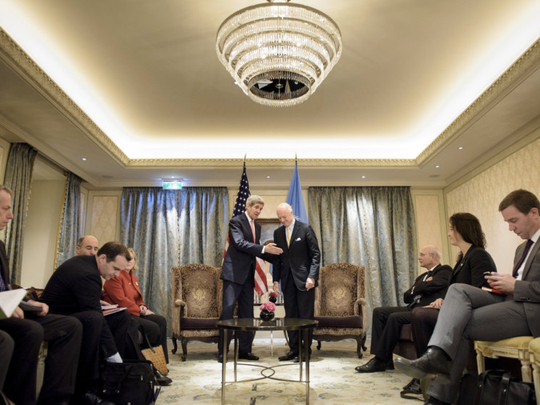
The Middle East region is at a crossroads. The many events that have occurred over the past few months — the nuclear agreement with Iran, Russian involvement in Syria, the growing migrant crisis — will obviously influence the course of events in the future. In a confused environment where the relationship between a block, led by Saudi Arabia, and Iran seems to be the question of essence, two elements deserve special attention.
Last week, a diplomatic gathering in Vienna brought together those who think they should only fight Daesh (the self-proclaimed Islamic State of Iraq and the Levant) with the help of Syrian President Bashar Al Assad, and those who think Al Assad is responsible for it — which in a second, more sensible step, considers how long Al Assad should stay in office to make sure what occurred in Iraq doesn’t happen again.
In the end, very few care about Al Assad himself (except French Foreign Affairs Minister Laurent Fabius and his aides, for ideological and well-known reasons): Russians want to keep their position in Syria; Iranians want to keep their logistical links with Lebanon’s Hezbollah; Saudi Arabia wants Al Assad’s departure (at any price, it seems), mainly to contain Iran; and the West wants to fight Daesh. With all this, it appears Vienna’s meeting embraced other wider issues that won’t resolve themselves overnight.
The other event of importance was the election in Turkey. The AK Party of President Recep Tayyip Erdogan, who lost most of his previous prestige due to the autocratic use of power and systematic duplicity, won a majority of seats last Sunday in his bid to recover political legitimacy.
With as many holes as in a sieve, ‘Western ally’ Turkey let extremists from all over the world pass through its border to fight in Syria along with the terrorists, to whom the Turkish secret services provided finance and all kinds of logistical aid.
Similarly, Turkey turned a blind eye to refugees going the other way, letting them reach Greece and then the rest of Europe. It said it fought Daesh, but actually, it fought the Kurds. It said it wanted a ‘no-fly zone’ over Syria to protect refugees, but Kurds once again were in sight, not to mention second thoughts against the integrity of Syria.
Lastly, it suddenly ‘discovered’ there were Daesh cells at home, when everybody knew of them already.
The conclusion is clear: A re-launched war with the Kurds is putting at stake a necessary peaceful process towards autonomy; Turkey, being from now on a new terrorist target, after the monstrous attack of October 10, also has a damaged economy rotten by flourishing corruption.
What will come next, after the meeting in Vienna and the Turkish election results, remains to be seen in another element of greater importance — the return of Russia in the Middle East. Will a procrastinating West witness a remake of the 19th century feud between the Sublime Porte and Russia, who have both understood for a long time that good feeling cannot be taken in lieu of foreign policy? A positive point coming from Vienna is the confirmation that it is time for reality; which in diplomacy matters — and contrary to what some Arab press has recently reported — also means that ‘our enemy’s enemy’ may not be 100 per cent our friend, but is still closer than our enemy. And the free world’s enemy has a name: Daesh.
Former US President Franklin D. Roosevelt teamed up with Russian executioner Joseph Stalin against Hitler in the Second World War, and Al Assad stands still short of the same comparisons.
Looking at US President Barack Obama’s undecided policy in the region, one may easily understand the Arab states looking eastward more attentively. Will Europe grasp the opportunity to join the deciders’ club? Maybe, if and when it chooses the right leaders.
Luc Debieuvre is a French essayist and a lecturer at IRIS (Institut de Relations Internationales et Strategiques) and the ‘FACO’ Law University of Paris.








